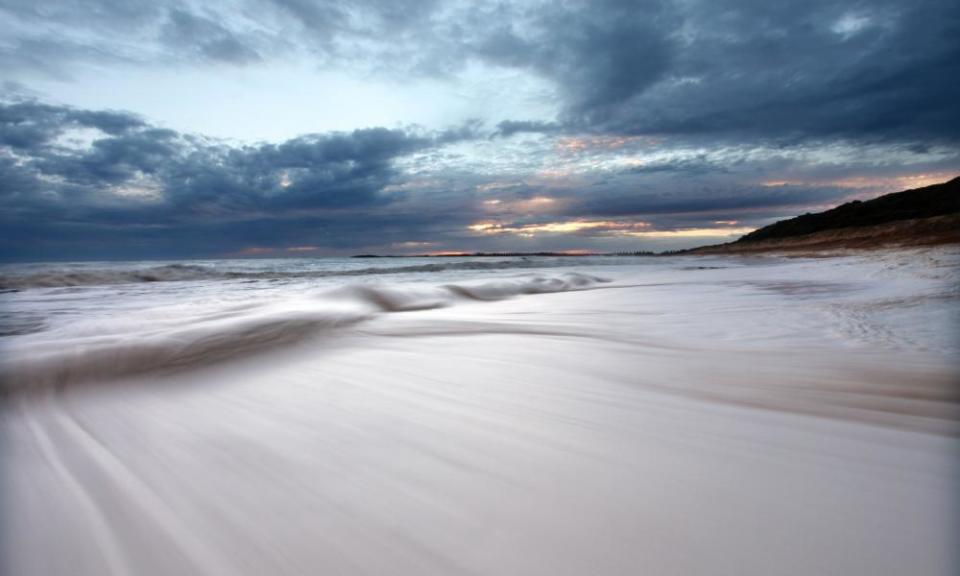Your home town is a safe harbour. You don't want it to change like you do | Brigid Delaney's diary

When the train pulled into the station in Warrnambool in south-west Victoria on Friday night, it had been a year, maybe more, since I had been home.
Home is first felt in the lungs. Stepping on to the train platform, in winter there is the sharp brace at the first intake of breath, and in summer the air is soft and briny with sea mist.
A home town can be both the most boring place and the most exciting place ever, often in the space of a day
I waited outside the station, even though no one had been arranged to pick me up. How many times had I waited there, keeping an eye out for my parents’ car, never quite sure which one of them would come for me? Hundreds of times? Thousands?
But they haven’t lived in the district for more than a year now, and I realised – not without apprehension of a future, greater loss – that they would probably never again collect me from what F Scott Fitzgerald termed “the thrilling returning trains of my youth”.
I shook myself out of this morbid train of thought and rang a taxi to take me to my hotel. I was speaking at a conference in a hall where, aged eight, I had played the organ in an excruciating recital. I was staying was at a hotel that had once been a live music venue that, at the age of 16, didn’t look too closely at my fake ID.
And so it is with home towns. A building is never just a building and a road is never just a road. Instead, returning home after a long absence, everything teems with association.
On Saturday I walked from the beach down long avenues of Norfolk pines past the caravan park and the adventure playground, up the rise of the hill towards the war memorial that the locals call the Dirty Angel. Each thing I saw flooded with associations and memories.
A simple walk through your home town is never really that simple; time, space and the past collapses. It’s like you’re walking alongside a ghost, but that ghost is you.
Our home towns are the first time we get a sense of place, and of spirit of place – where we discover the world, the shops and clifftops, the changing mood of a town, the way weather shifts – or the economy, the way it can be both the most boring place and the most exciting place ever, often in the space of a day. They’re our first country.
On Saturday, after meeting a schoolfriend for breakfast, I went to the shops. Every day after school I would loiter there with friends, at the chip shop or in and out of Sportsgirl – with no money to spend but lots of time to look. Now, walking along the main street was like running your finger along the skin of someone dear and familiar to you. Every bump and crease, every plastic outdoor table and the shady, rundown rears of the arcades. But now: shops are missing. The newsagent! And the record shop!
Friends of mine have never left and have absorbed the changes casually. “Oh yeah – that’s gone years ago. But there’s this new tapas restaurant that does share plates and a cocktail bar.”
I did not come home for tapas.
Prodigal sons and daughters don’t want tapas; they want the chip shop that was there in the 1980s and they want the record shop and the Sportsgirl. They want everything preserved in aspic.
If everything back there in my home town stays the same, then risks and change can happen elsewhere. I need my safe harbour so I can get smashed in the storms, even if I only dock there for a night or two every few years. You need a place to repair the boat.
Just don’t call it nostalgia. It’s something else. I feel different there. It feels rightful. In some places there is a feeling of deep ease. You sink into it, and every molecule of you says, “We have come home.”
For white Australians this feeling is sometimes qualified. It’s hard to develop a spiritual language around land when it is stolen. A relationship with a stolen thing will be, by its very nature, an impoverished relationship. In white Australia our relationship with land – and by extension – place, is measured largely in commercial terms. We take great delight when its “value” rises. We buy it and sell it, based on its worth in market terms. We are often less attuned to how place interacts with how we feel.
But when I am old and no longer need to be close to train stations or airports, when I have seen all the world, I shall return home. Not because of the childhood memories but because I feel it, all of it, the soil and the sand and the air and trees, to be my place. Where my second cousins serve me in shops and pass me in the street. My paternal ancestors are all buried here – in the cemeteries of Tower Hill and east Warrnambool – and it is my hope that one day, I will be too. Bones settled down in that volcanic soil or ashes scattered in the sea mist won’t feel like death, but will be like coming home.

 Yahoo News
Yahoo News 